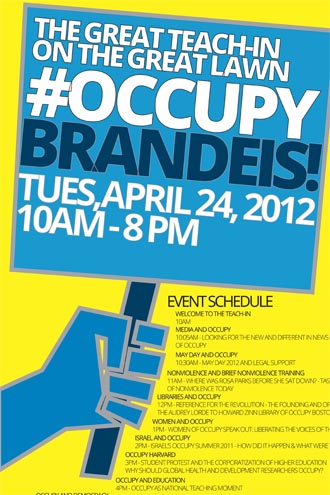All-day teach-in will focus on the Occupy Movement
In case of inclement weather, teach-in will be in the campus center atrium

Members of the Brandeis faculty, student body and staff have organized an all-day teach-in from 10 a.m. to 8 p.m. Tuesday on the Great Lawn outside the Shapiro Student Center to consider various aspects of the Occupy Movement.
Among the subjects of the sessions are “Media and Occupy,” “May Day and Occupy,” “Israel and Occupy,” “Occupy and Democracy” and many others. Provost Steve Goldstein will welcome participants, President Fred Lawrence will lead a discussion of “Occupy as National Teaching Moment” and Environmental Studies Program chair Laura Goldin will hold a session on “Whose Earth Anyway? Environmental Justice for the 99%.” Numerous students and other faculty will participate, as will activists from around greater Boston.
In case of inclement weather, the teach-in will be held in the campus center atrium.
The global Occupy Movement made its debut in America less than a year ago with the Occupy Wall Street demonstration at Zuccotti Park in New York City's Wall Street financial district. The protest was initiated by the Canadian activist group Adbusters with the objective of expressing deep-rooted dissatisfaction amongst Americans with the way the country has been run and the resulting debt and economic hardship inflicted on ordinary people. Since then, Occupy has spread to hundreds of city centers around the country.
An important aspect of the teach-in, organizers say, is to inform participants that the Occupy Movement involves concerns beyond the national level. A discussion taking place at 2 p.m. on Tuesday will follow the events of Israel’s Occupy summer 2011. The discussion will be led by Israeli Brandeis undergraduates who have been actively involved in this movement.
Occupy Israel is a series of social justice protests involving hundreds of thousands of protesters from a variety of socio-economic and religious backgrounds opposing the continuing rise in the cost of living (particularly housing) and the deterioration of public services such as health and education.
Gil Zamir’15, who will be one of the discussion leaders Tuesday and who was living in Tel Aviv during the Israeli protests, says "Israel and the US are two very different countries, and so the reasons fueling the protests are different. However, it is important to recognize that they are both essentially an expression of dissatisfaction and a means to be heard by the leaders of the country.”
Zamir says that to him, personally, the Occupy movement is about enacting a change in society: “Whether the Occupy movements in Israel and the United States were a success or not depends largely on your perspective, it is something open to debate," he says. "However, they created a positive, organized energy which turned a faceless demonstration into a historic movement.”
According to a Wikipedia definition emphasized by Sociology Professor Gordon Fellman, one of the organizers of Tuesday's sessions, “teach-ins are meant to be practical, participatory and oriented toward action. While they include experts lecturing on the area of their expertise, discussion and questions from the audience are welcome.”
Teach-ins as a form of inquiry and discussion with action implications began at the University of Michigan in 1965, when the topic was opposing the Vietnam War, according to Fellman, who teaches peace, conflict, and coexistence studies.
The format of the teach-in is casual. People come for some speakers and discussions, perhaps drifting in and drifting out several times during the day.
The Brandeis teach-in will culminate in an Occupy General Assembly beginning at 7 p.m. This session is for anyone who wishes to reflect on the day’s events with an eye toward how the community and its individual members might choose to act as the movement continues to develop.
Shea Riester’12, a Brandeis undergraduate who participated in Occupy Wall Street as well as the Occupy Boston demonstration opposite the Federal Reserve Bank, will be helping convene that session.
According to Riester, the holding of a general assembly was one of the many characteristics of Occupy that set it apart from other models of organized protest. In the absence of any symbolic figurehead or leader in the Occupy movement, Riester explains, the general assembly is held as a democratic means of decision making, where everyone’s voice can be heard.
The teach-in coincides with the opening of Sarah Zell Young’s “Occupy Sanhedrin,” an exhibit at the Women’s Studies Research Center examining religious and secular roles for Jewish women from the Second Temple to the present.
Categories: General, Student Life





